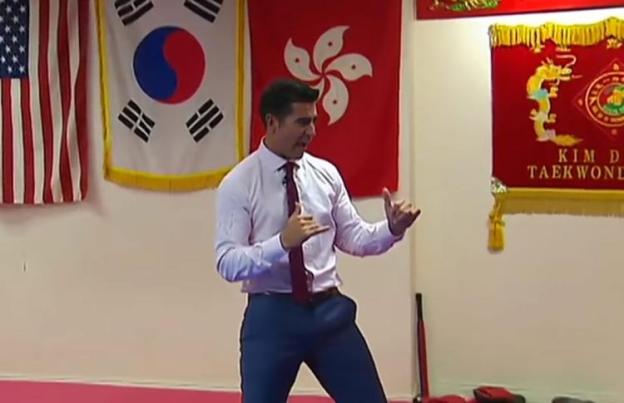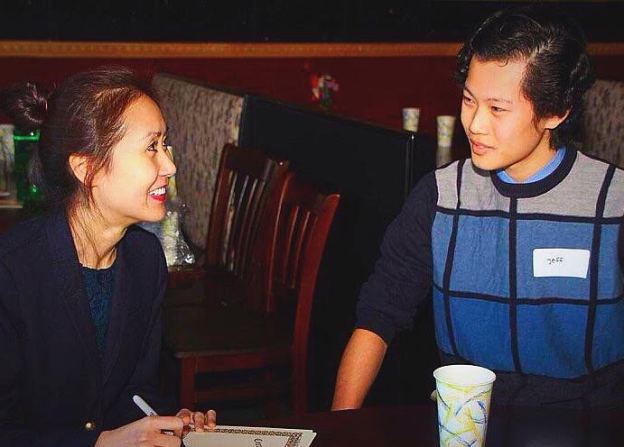Monday, October 3, 2016. Fox News’ “The O’Reilly Factor” included a segment called ‘Watters World Segments: Chinatown,’ where host Jesse Watters went to Chinatown, NY to poll for the presidential election. The show worked off of Repub. Candidate Donald J. Trump’s mentioning of China twelve times in the first presidential debate against former Secretary of State and Dem. Nominee for president, Hillary R. Clinton. As Bill O’Reilly put it while introducing the segment, Watters was sent to “find out what folks think about the 2016 election.” (https://www.youtube.com/watch?v=PJmnLzw8NA4)
By all means, Fox News is a major news outlet that provides information for countless Americans about breaking social, economic, and racial issues across the globe. They are held responsible as the sole substantial ‘Republican’ news network in America and broadcast to approximately 94,700,000 American households. Yet, despite this acclaim, they number zero in Peabody Awards[1], Emmys, du-Pont Columbia awards[2], and Robert F. Kennedy Journalism [3]Awards, all prestigious decorations among the broadcasting community.
This fact may be attributed to a supreme bias among the judges. It could indicate a ‘liberal,’ and therefore detrimental, leaning for these awards. It is possible.
In light of “The O’Reilly Factor’s” recent segment, however, it is also likely that awards that dictate the best in political inclusion, expanding horizons, and encouraging empathy do not condone the blatant racism that Fox News sometimes adheres to.
In what Jesse Watters tweeted was “meant to be taken as tongue-in-cheek,” the Asian-American Journalist Association has called “rude, offensive…and damaging.”[4] The four-minute segment saw Watters mock Chinese-Americans with questions often completely unrelated to the presidential debate or Donald Trump.
He asked Americans questions such as “Am I supposed to bow to say hello?” and mocked interviewees who didn’t understand due to a language barrier. The segment was interrupted with clips from martial arts films, although it should be noted that Long Duk Dong did not make an appearance, somehow. After an older woman did not answer Watters’ question due to limited English skills, instead of the excerpt being cut from the final draft, the network added a snippet of a woman shouting “Speak! Speak! Why don’t you speak?”
The most harmful blow to Chinese Americans comes at the two-minute mark. Watters asks, “Is China, America’s enemy or friend?” The lady replies that China and America are, of course friends. The host’s rebuttal, “Can you guys take care of North Korea for us?” It’s important to be mindful that this impromptu interview is taking place in New York, in the United States. Watters speaks under the assumption that this woman is, for whatever reason, Not American; she is not a part of the ‘us’ Watters refers to. The woman’s response? A look of bewilderment followed by, “Wow…That is too much.” What is it about this woman that so detracts from her ‘Americanness’ that Watters groups her away from himself? Is it simply because she is of Asian descent? It seems so.
For the Chinese-Americans rightfully outraged by such a segment, there comes an important question: ‘Why us?’
Bill O’Reilly, the host of the show, even said following the clip, “…I know we’re going to get letters-inevitable.” So Fox knew that it was broadcasting something potentially offensive and decided to follow through anyways.
Returning to the question at hand, ‘Why us?’ the rejoinder is simple. Fox News considered the possible backlash from Chinese-Americans and decided that cheap laughs were worth it anyway; they understood that Asian Americans are some of the least politically represented minorities in the United States and they took advantage. There wouldn’t be any ‘real’ consequences.
Even Watters’ 110-character twitter ‘apology’ was a jab. “My man-on-the-street interviews are meant to be taken as tongue-in-cheek and I regret if anyone found offense.” He is disappointed if anyone found offense. For those that don’t know, this is called a non-apology. It fails to express any remorse and beyond that doesn’t not even admit any wrongdoing, instead pinning the situation on viewers.
So the answer is simple. We are targeted because there is no consequence. We are alienated because we do not have enough political representation.
And yet, when asked by others, we consider ourselves Americans. We are in the armed forces. We are novelists, and athletes, and neighbors. We pay our share of taxes. We attend the same schools that most other Americans attend and our goals of education are strong within the American Dream.
For those that say these reactions to racist stereotypes are ‘out of proportion’ or ‘over the top,’ they don’t realize what it means to be isolated from one’s country. They don’t understand the pain of being branded as a “You” among “Us.” It is devastating.
This is especially so for those first-generation immigrants who sought America as a home. They left behind their families, friends, and native countries for a place advertised as the epitome of equality and education. Today, these are goals we are still striving towards together.
So as we seek the hearts and minds of not just Asian Americans, but the span of Americans as a whole, we seek the comfort that we are all apart of the United States, that there is no ‘you’ and ‘us,’ but We.
[1] http://www.peabodyawards.com/awards
[2] https://journalism.columbia.edu/dupont
[3] http://rfkhumanrights.org/who-we-are/awards/rfk-journalism-awards/
[4] https://www.facebook.com/notes/asian-american-journalists-association/aaja-demands-an-apology-for-racist-and-offensive-fox-news-segment-on-chinese-ame/10154520729424654




